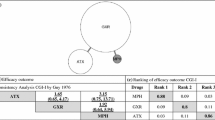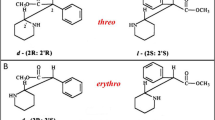Abstract
Introduction
Stimulant medications are the most effective drugs in the treatment of attention-deficit hyperactivity disorder (ADHD) in children and in adults. However, some patients do not respond to this treatment and other patients suffer from adverse effects. Very often there are also comorbid disorders that warrant treatment or there is somatic comorbidity that precludes the prescription of stimulants. As a result, alternative treatments for the treatment of ADHD have been explored, such as antidepressant agents. In this systematic review the evidence base for the effect of antidepressants for ADHD in adult patients is determined.
Methods
Electronic and hand searches were conducted in order to identify clinical trials studying antidepressants for the treatment of ADHD in adult patients. The trials were screened for methodological characteristics and treatment-effect sizes. The odds ratio was calculated for randomized controlled trials with bupropion. A descriptive review of all the randomized controlled studies and an overview of the nonrandomized studies was developed.
Results
Only eight randomized controlled trials were retrieved with four different compounds. Five studies concerned bupropion and the meta-analysis indicates a beneficial effect for bupropion compared with placebo as measured with the Clinical Global Improvement Scale (odds ratio 2.42 [95% CI 1.09 to 5.36]). Several studies suffer from clinical and methodological shortcomings, such as exclusion of patients with comorbid disorders, short treatment duration, or a lack of information with respect to the randomization procedure.
Conclusion
Although there is a need for alternative interventions for the treatment of ADHD, such as with antidepressant agents, the evidence base is not large. Only treatment with bupropion seems to have a medium-range effect size, but this is less than that of stimulant medications.
Similar content being viewed by others
References
Wilens TE. Drug treatment for adults with attention deficit hyperactivity disorder. Drugs. 2003;63:395–2411.
Asherson P. Clinical assessment and treatment of attention deficit and hyperactivity disorder in adults. Expert Rev Neurother. 2005;5:25–539.
Faraone SV, Spencer T, Aleardi M, Pagano C, Biederman J. Meta-analysis of the efficacy of methylphenidate for treating adult attention-deficit/hyperactivity disorder. J Clin Psychopharmacol. 2004;24:4–9.
Biederman J, Spencer T, Wilens T. Evidence based pharmacotherapy of attention-deficit/hyperactivity disorder. Int J Neuropsychopharmacol. 2004;7:7–97.
Kollins SH, MacDonald EK, Rush CR. Assessing the abuse potential of methylphenidate in non-human and human subjects: a review. Pharmacol Biochem Behav. 2001;68:11–627.
Spencer T, Biederman J, Wilens T, Harding M, O’Donnell D, Griffin S. Pharmacotherapy of attention-deficit/hyperactivity disorder across the life cycle: a literature review. J Am Acad Child Adolesc Psychiatry. 1996;35:09–432.
Wilens TE, Spencer TJ. The stimulants revisited. Child Adolesc Psychiatr Clin N Am. 2000;9:73–603.
Spencer T. Stimulant treatment for adult attentiondeficit/hyperactivity disorder. Psychiatr Clin N Am. 2004;27:61–372.
McGough JJ, Smalley SL, McCracken JT, et al. Psychiatric comorbidity in adult ADHD: findings from multiplex families. Am J Psychiatry. 2005;162:1621–1627.
Greenhill L, Pliska S, Dulcan MK, et al. Practice parameters for the use of stimulant medication in the treatment of children, adolescent and adults. Am Acad Child Adolesc Psychiatry. 2002;41(suppl.):26–49.
Stone KJ, Viera AJ, Parman CL. Off-label applications for SSRIs. Am Fam Physician. 2003;68:98–504.
Chen H, Reeves JH, Finchman JE Kennedy WK, Dorfman JH, Martin BC. Off-label use of antidepressants, anticonvulsant, and antipsychotic medications among Georgia Medicaid Enrolees in 2001. J Clin Psychiatry. 2006;67:72–982.
Het doelmatig gebruik van antidepressiva in de behandeling van andere indicaties dan stemmingsstoornissen. Concensus vergadering RIZIV, comité voor de evaluatie van de medische praktijk inzage geneesmiddelen. Folia Pharmacother. 2008;35:4.
Uçeyler N, Häuser W, Sommer C. A systematic review on the effectiveness of treatment with fibromyalgia syndrome. Arthritis Rheum. 2008;59:279–1298.
Deeks JJ, Higgins JPT, Altman DG. Chapter 9: Analysing data and undertaking meta-analyses. In: Higgins JPT, Green S, eds. Cochrane Handbook for Systematic Reviews of Interventions. Version 5.0.1 (updated September 2008). The Cochrane Collaboration; 2008. Available at: www.cochrane-handbook.org.
Wilens TE, Biederman J, Prince J, et al. Sixweek, double-blind, placebo-controlled study of desipramine for adult attention deficit hyperactivity disorder. Am J Psychiatry. 1996;153:1147–1153.
Kuperman S, Perry PJ, Gaffney GR, et al. Bupropion SR vs. methylphenidate vs. placebo for attention deficit hyperactivity disorder in adults. Ann Clin Psychiatry. 2001;13:129–134.
Wilens TE, Spencer TJ, Biederman J, et al. A controlled clinical trial of bupropion for attention deficit hyperactivity disorder in adults. Am J Psychiatry. 2001;158:282–288.
Dorrego MF, Canevaro L, Kuzis G, Sabe L, Starkstein SE. A randomized, double-blind, crossover study of methylphenidate and lithium in adults with attention-deficit/hyperactivity disorder: preliminary findings. J Neuropsychiatry Clin Neurosci. 2002;14:289–295.
Wilens TE, Haight BR, Horrigan JP, et al. Bupropion XL in adults with attention-deficit/hyperactivity disorder: a randomized, placebo-controlled study. Biol Psychiatry. 2005;57:793–801.
Reimherr FW, Hedges DW, Strong RE, Marchant BK, Williams ED. Bupropion SR in adults with ADHD: a short-term, placebo-controlled trial. Neuropsychiatr Dis Treat. 2005;1:245–251.
Levin FR, Evans SM, Brooks DJ, Kalbag AP, Garawi F, Nunes EV. Treatment of methadone maintained patients with adult ADHD: double-blind comparison of methylphenidate, bupropion and placebo. Drug Alcohol Depend. 2006;81;137–148.
Weiss M, Hechtman L. The Adult ADHD Research Group. A randomised double-blind trial of paroxetine and/or dextroamphetamine and problemfocused therapy for attention-deficit/hyperactivity disorder in adults. J Clin Psychiatry. 2006;67:11–619.
Gobbi G, Slater S, Boucher N, Debonnel G, Blier P. Neurochemical and psychotropic effects of bupropion in healthy male subjects. J Clin Psychopharmacol. 2003;23:33–239.
Wilens TE, Dodson W. A clinical perspective of attention-deficit/hyperactivity disorder into adulthood. J Clin Psychiatry. 2004;65:301–1313.
Demyttenaere K, Jaspers L. Review: bupropion and SSRI-induced side effects. J Psychopharmacol. 2008;22:92–804.
Wellbutrin XL (bupropion hydrochloride extendedrelease tablets) prescribing information. Research Triangle Park, NC: GlaxoSmithKline; 2005.
Spencer T, Wilens T, Biederman J, Faraone SV, Ablon JS, Lapey K. A double-blind, crossover comparison of methylphenidate and placebo in adults with childhood-onset attention-deficit hyperactivity disorder. Arch Gen Psychiatry. 1995;52:34–443.
Wender PH, Reimherr FW. Bupropion treatment of attention-deficit hyperactivity disorder in adults. Am J Psychiatry. 1990;147:018–1020.
Levin FR, Evans SM, McDowell DM, Brooks DJ, Nunes J. Bupropion treatment for cocaine abuse and adult attention-deficit/hyperactivity disorder. J Addict Dis. 2002;21:1–16.
Wilens TE, Prince J, Biederman J, et al. An open study of sustained release bupropion in adults with attention-deficit/hyperactivity disorder and substance use disorders. Presented at the 48th annual meeting of the Academy of Child and Adolescent Psychiatry; October 23–28, 2001; Honolulu, Hawaii.
Wilens TE, Prince JB, Spencer TE, et al. An open trial of bupropion for the treatment of adults with attention-deficit/hyperactivity disorder and bipolar disorder. Biol Psychiatry. 2003;54:9–16.
Wilens TE, Biederman J, Mick E, Spencer TJ. A systematic assessment of tricyclic antidepressants in the treatment of adult attention-deficit hyperactivity disorder. J Nerv Ment Dis. 1995;183:8–50.
Preskorn SH, Weller E, Jerkovich G, et al. Depression in children: concentration dependent CNS toxicity of tricyclic antidepressants. Psychopharmacol Bull. 1988;24:140–142.
Elia J, Ambrosini PJ, Rapaport JL. Treatment of attention-deficit-hyperactivity disorder. N Engl J Med. 1999;340:80–788.
Popper CW. Pharmacologic alternatives to psychostimulants for the treatment of attention-deficit/hyperactivity disorder. Child Adolesc Psychiatr Clin N Am. 2000;9:05–646
Horrigan JP. Present and future pharmacotherapeutic options for adult attention deficit/hyperactivity disorder. Expert Opin Pharmacother. 2001;2:73–586.
Abramowicz M. Sudden death in children treated with a tricyclic antidepressant. Med Lett Drugs Ther. 1990;32:3–54.
Wagner KD, Fershtman M. Potential mechanism of desipramine-related sudden death in children. Psychosomatics 1993;34:80–82.
Popper CW, Zimnitzky B. Sudden death putatively related to desipramine treatment in youth: a fifth case and a review of speculative mechanisms. J Child Adolesc Psychopharmacol. 1995;5:83–300.
Biederman J, Thisted R, Greenhill L, Ryan N. Estimation of the association between desipramine and the risk for sudden death in 5- to 14 year-old children. J Clin Psychiatry. 1995;56:7–93.
Spencer TJ, Biederman J, Coffey B, et al. A doubleblind comparison of desipramine and placebo in children and adolescents with chronic tic disorder and comorbid attention-deficit/hyperactivity disorder. Arch Gen Psychiatry. 2002;59:649–656.
Pliszka SR. Non-stimulant treatment of attention deficit hyperactivity disorder. CNS Spectrums. 2003;8:253–258.
Cozza KL, Armstrong SC, Oesterheld JR. Drug Interaction Principles for Medical Practice. Arlington, VA: American Psychiatric Publishing, Inc.; 2003.
Wilens TE, Spencer TJ, Biederman J. A review of the pharmacotherapy of adults with attention-deficit/hyperactivity disorder. J Atten Disord. 2002;5:89–202.
Pliszka SR. New developments in psychopharmacology of attention deficit hyperactivity disorder. Expert Opin Investig Drugs. 2001;10:797–1807.
Arabgol F, Panaghi L, Hebrani P. Reboxetine versus methylphenidate in treatment of children and adolescents with attention deficit-hyperactivity disorder. Eur Child Adolesc Psychiatry 2008;18:53–59.
Double blind, four week trial of [S,S] reboxetine and atomoxetine in adults with ADHD. Clinical Trials. gov web site. Trial no. NCT005620SS. Available at: www.clinicaltrials.gov/ct2/show/NCT005620SS. Accessed October 30 2008.
Stahl SM. Stahl’s Essential Psychopharmacology. Neuroscientific Basis and Practical Applications. 3rd edition. Cambridge University Press; 2008.
Ernst M, Liebenauer LL, Jons PH, Tebeka D, Cohen RM, Zametkin AJ. Selegeline in adults with attention deficit hyperactivity disorder: clinical efficacy and safety. Psychopharmacol Bull. 1996;32:27–334.
Wender PH, Wood DR, Reimherr FW, Ward M. An open trial of pargyline in the treatment of attention deficit disorder, residual type. Psychiatry Res. 1983;9:29–336.
Ernst M, Liebenauer LL, Tebeka D, et al. Selegeline in ADHD adults: plasma monoamines and monoamine metabolites. Neuropsychopharmacology. 1997;16:76–284.
Szabadi E, Bradshaw CM. Seminars in Clinical Psychopharmacology. 2nd edition. London: Royal College of Psychiatrists; 2004.
Oades RD. The role of the serotonin system in ADHD: treatment implications. Expert Rev Neurother. 2007;7:357–1374.
Damsa C, Bumb A, Bianchi-Demicheli F, et al. “Dopamine-dependent” side effects of selective serotonin reuptake inhibitors: a clinical review. J Clin Psychiatry. 2004;65:1064–1068.
Schmitt JA, Ramaekers JG, Kruizinga MJ, van Boxtel MP, Vuurman EF, Riedel WJ. Additional dopamine reuptake inhibition attenuates vigilance impairment induced by serotonin reuptake inhibition in man. J Psychopharmacol. 2002;16:07–214.
Hoehn-Saric R, Lipsey JR, McLeod DR. Apathy and indifference in patients on fluvoxamine and fluoxetine. J Clin Psychopharmacol. 1990;10:43–345.
Hoehn-Saric R, Harris GJ, Pearlson GD, Cox CS, Machlin SR, Camargo EE. A fluoxetine induced frontal lobe syndrome in an obsessive compulsive patient. J Clin Psychiatry. 1991;52:31–133.
Popper CW. Antidepressants in the treatment of attention-deficit/hyperactivity disorder. J Clin Psychiatry. 1997;58(suppl. 14):4–29.
Hedges D, Reimherr FW, Rogers A, Strong R, Wender PH. An open trial of venlafaxine in adult patients with attention deficit hyperactivity disorder. Psychopharmacol Bull. 1995;31:79–783.
Baker GB, Bornstein RA, Roujet AC, Ashton SE, van Muyden JC, Coutts RT. Phenylethylaminergic mechanismens in attention deficit disorder. Biol Psychiatry. 1991;29:5–22.
Berigan TR. Off-label use of venlafaxine in psychiatric and nonpsychiatric conditions. Prim Psychiatry. 2003;10:2–116.
Biederman J, Spencer T. Psychopharmacology of adults with attention-deficit/hyperactivity disorder. Prim Care Companion J Clin Psychiatry. 2004;1:7–62.
Peterson K, McDonagh MS, Fu R. Comparative benefits and harms of competing medications for adults with ADHD: a systematic review and indirect comparison meta-analysis. Psychopharmacology. 2008;197:1–11.
Author information
Authors and Affiliations
Corresponding author
Additional information
We are sad to report that Dr. Siegfried Tuinier passed away suddenly in December 2008. Our thoughts and best wishes are with his family and friends at this difficult time.
Rights and permissions
About this article
Cite this article
Verbeeck, W., Tuinier, S. & Bekkering, G.E. Antidepressants in the treatment of adult attention-deficit hyperactivity disorder: a systematic review. Adv Therapy 26, 170–184 (2009). https://doi.org/10.1007/s12325-009-0008-7
Received:
Published:
Issue Date:
DOI: https://doi.org/10.1007/s12325-009-0008-7




